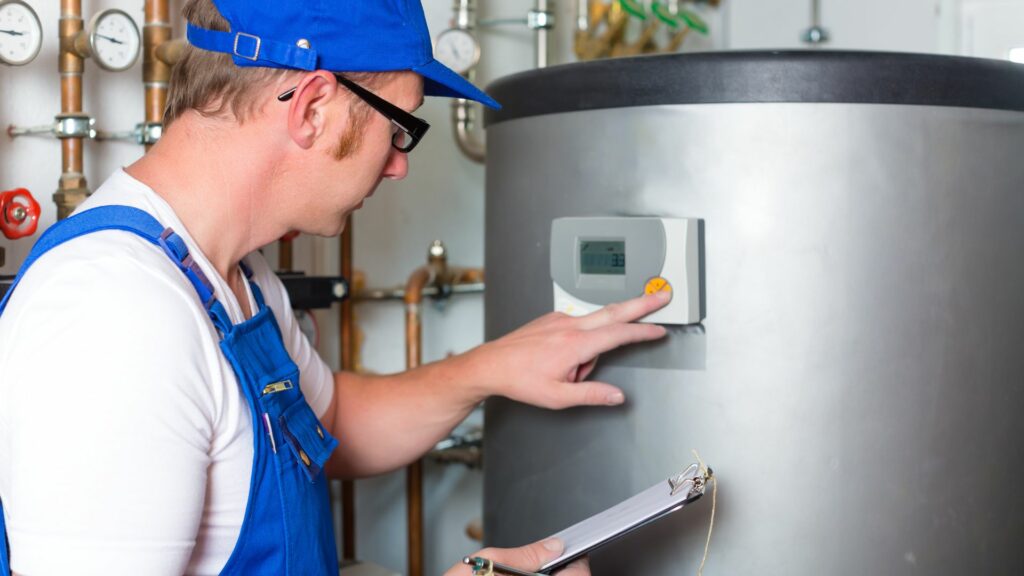A Comprehensive Dive into Hot Water Solutions
The essence of a comfortable home often lies in details like the hot water heater. A disruption in the water heater can push us to explore options for water heater repair, water heater replacement, or even the water heater installation cost.
In this world, there are two main types of water heaters: storage tanks (also called hot water tanks) and tankless heaters. This comprehensive guide dives deep into both.
1. A Journey through Time: Historical Context
Hot Water Tanks:
Decades ago, water heater installation required significant space and was typically the traditional hot water tank installation. These tanks stand as symbols of tried-and-true technology.
Tankless Hot Water Heaters:
With innovations around electric water heaters and gas water heaters, the tankless versions began making their mark.
2. Spatial Narratives: Size, Placement, and Design Dynamics
Hot Water Tanks:
Hot water tanks, by their nature, are voluminous. They not only require dedicated space but also dictate spatial considerations in many homes. Utility areas might be designed around the tank, which becomes a fixed point. While modern versions have sleeker exteriors, their essence remains the same – large, functional, and unassuming.
Tankless Hot Water Heaters:
Compactness is their hallmark. These devices offer flexibility, allowing homeowners to utilize spaces previously earmarked for bulky tanks. Beyond just functionality, their designs also speak volumes, often fitting seamlessly into modern home aesthetics.

3. An Odyssey of Efficiency: The Energy Saga
Hot Water Tanks:
These tanks face a continuous battle against heat loss. Even when not in use, they consume energy to maintain the stored water’s temperature. The larger the tank, the greater the potential energy wastage. While innovations like better insulation materials have been introduced, the underlying inefficiency remains.
Tankless Hot Water Heaters:
A revolution in energy efficiency, these systems have changed the game. By heating water on-demand, they’ve negated the need for continuous energy expenditure. Advanced models even adjust energy usage based on real-time demand, optimizing every joule of energy.
4. Dynamics of Demand: Flow, Capacity, and Adaptability
Hot Water Tanks:
The charm of a hot water tank lies in its reserve. This reservoir becomes a safety net, ensuring multiple tasks like bathing, cooking, and cleaning can occur simultaneously. However, this boon has a limit. Once drained, households face a waiting period, a lull where the tank must refill and reheat.
Tankless Hot Water Heaters:
Endlessness is their promise. As water flows, it heats up, offering an endless supply.
But there’s a caveat. Their capacity to deliver depends on flow rates. While perfect for continuous single uses, they might falter if multiple high-demand applications run concurrently.
5. The Passage of Time: Durability, Maintenance, and Longevity
Hot Water Tanks:
Constructed primarily from steel, these tanks are robust. With an inner lining to prevent corrosion and regular maintenance to combat sediment buildup, they can serve households faithfully for up to 15 years. However, they’re not invincible. Over time, wear and tear, especially in hard water areas, can take a toll.
Tankless Hot Water Heaters:
Built for the long haul, many of these systems boast lifespans exceeding 20 years. Their longevity is attributed to both superior construction and the absence of water storage, which negates corrosion issues. Maintenance, though, remains vital. Periodic descaling and electronic checks ensure they operate optimally.

6. The Economic Perspective: Costs, Savings, Or Hot Water Tank Repair
Hot Water Tanks:
Their initial cheapness has made them a perennial favorite. For homeowners with tight budgets or those looking for short-term solutions, these tanks offer great value. However, when energy costs, maintenance, and potential replacements over time are factored in, the financial landscape shifts.
Tankless Hot Water Heaters:
The initial investment is much higher. Yet, the narrative of long-term savings begins to take shape when considering reduced energy bills and extended lifespan. For many, these systems present a value proposition that, while not immediately apparent, becomes evident over the years.
7. Stewards of the Environment: Analyzing Ecological Impact
Hot Water Tanks:
Their inefficiencies don’t just reflect on bills; they have environmental implications. Continuous heating means higher fossil fuel consumption (if not using renewable energy), leading to a larger carbon footprint. Additionally, tank disposal at the end of life poses environmental concerns.
Tankless Hot Water Heaters:
Their efficiency narrative extends to environmental benefits. Lower energy consumption directly translates to reduced emissions. Their small size reduces waste when they are no longer useful. Additionally, their ability to work with renewable energy sources makes them even more environmentally friendly.
8. User Experiences: A Tale of Two Systems
Hot Water Tanks:
Many homeowners feel a nostalgic connection to their hot water tanks, especially in older homes with a long history. They embody a legacy, a system that has served generations and people comprehend its essence. The straightforward operation, visible cues like water level indicators, and regular maintenance schedules offer a sense of routine and consistency.
Concerns over Waiting: On the flip side, an aspect often highlighted by larger families is the wait time. Picture a cold winter morning when everyone’s in line for a shower. The early birds experience a steamy experience, but those who are last in line might receive a cold surprise. This lag, the time between an emptied tank and its readiness post-refill, has been a pain point for many.
Tankless Hot Water Heaters:
Praise for consistency: User endorsements often gleam with experiences of continuous showers. The system’s ability to consistently deliver, irrespective of duration, stands out as its USP. Many homeowners share anecdotes of back-to-back showers or simultaneous appliance use without a dip in temperature.
Adjustment Period: However, the experience isn’t without its learning curve. New adopters often speak of initial days marked by trial and error, gauging the system’s capability and understanding its peak flow rates, especially when multitasking across appliances.

9. Installation Narratives: Setting the Stage
Hot Water Tanks:
For those replacing a water heater, especially the 40-gallon water heater which has been the standard size for many homes, the process can be straightforward.
If DIY water heater installation is your choice, be sure to understand all steps involved, including any electrical work and the use of thread compound to prevent leaks.
Space Chronicles: For homes under construction or undergoing renovations, architects and interior designers recount challenges in allocating dedicated spaces, ensuring easy accessibility for maintenance, and aesthetic concealment of the bulky apparatus.
Tankless Hot Water Heaters:
Hot water heater installation requires specific know-how, especially if you’re switching from a storage tank system. Some might need to upgrade their natural gas line or electrical configurations to accommodate the demands of these heaters. But, the type of water heater depends on your preference – gas or electric
Technical Tales: While the compactness is celebrated, plumbers and technicians also share narratives of infrastructural upgrades. Homes switching to tankless water heaters may need upgraded gas lines or electrical systems to handle the increased demand.
10. Future Horizons: Peering into Tomorrow’s Solutions
Hot Water Tanks:
Digital Integrations: As the world embraces IoT, hot water tanks aren’t far behind. Tanks can have smart features. These features include learning user habits and adjusting heating schedules. They can also sync with home automation systems for better efficiency.
Scientists are trying hard to find ways to keep water hot for longer without using too much energy by improving insulation.
Tankless Hot Water Heaters:
AI-Driven Excellence: The next frontier in tankless technology is predictive analysis powered by AI. Systems may soon analyze daily routines.
They can adapt heating cycles accordingly. This allows for hot water to be provided instantly when necessary. Additionally, you can save energy during expected periods of low activity.
Green Alignments: As homes go greener, tankless heaters will use solar or wind energy efficiently for water heating.
11. Making a Decision: Charting Your Course
Homeowners should chart out a multi-year financial plan beyond the initial outlay to maintain budgetary balance. This should factor in overall costs, potential repairs, replacements, and, importantly, energy bills. The narrative often shifts when viewed from a long-term lens.
Household Dynamics: Larger families, with potentially overlapping hot water needs, might have a different experience compared to smaller families or singles. Feedback from homes of similar sizes and routines can offer invaluable insights.
Space Play: Besides installation spaces, also think about maintenance access, hiding aesthetics, and possible relocation.
Homeowners in different stages of life have different priorities. Those who plan to stay in their home long-term prioritize differently than those planning to move in a few years.

12. Expert Chronicles: Wisdom from the Field
Professionals emphasize how each home’s water heater typically needs to be tailored to its unique needs. Some homes might benefit more from electric water heaters, while others might find gas water heaters more efficient. Some homes might only need a repair job as the most efficient and if that’s the case check out Calgary’s Best Water tank repair services including AAA Heating and Plumbing
Factors like the efficiency of the water heater, ease of getting the heater repaired, and understanding the different types of water heaters are all valuable inputs from experts in the field
Conclusion
In the age-old debate between hot water tanks and tankless systems, there’s no one-size-fits-all answer. As technology advances, the gap between the two might narrow further, with each adopting the best features of the other.
But for now, understanding the intricacies, listening to real-world experiences, and seeking expert opinions can guide homeowners to a decision that brings warmth and comfort for years to come.


